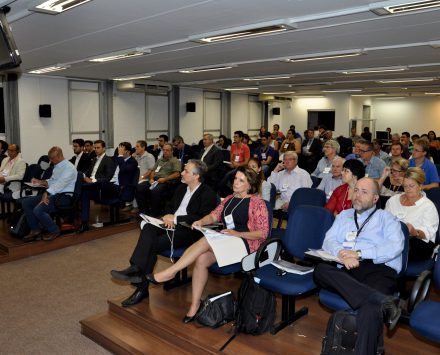Unlocking the Brazil potential for Biojet fuel production – roadmap to deliver over 25 Million ton sustainable aviation and marine fuels
oktober 20, 2016

Campinas, 18 October 2016 – Industrial and academic partners of Brazil and The Netherlands agreed to join forces in defining the most effective path to produce sustainable advanced biofuels.
Over 100 representatives of industry and public institutes participated in the workshop, coordinated by professors Telma Franco (UNICAMP) and Luuk van der Wielen (TU Delft). The workshop was organised as part of the Agropolo Campinas-Brasil initiative to build a roadmap aiming to double Sao Paulo State GDP income and half Green House Gas (GHG) emissions by 2050.
Participants agreed that the potential market for biobased aviation and marine fuels is considerable. To reach the Brazilian contribution to the global aviation (ICAO) target to reduce GHG emissions in 2050 by 50% compared to 2005 levels, 25 Million ton of biokerosene are needed. In order to reach this huge economic and climate potential, several technical and societal conditions have to be met already in 2030. These include a.o. secure feedstock supply, quality control facilities and infrastructural arrangements including pipe lines. But also integral biorefinery concepts need to be tested for viable scales and contextual boundary conditions. A full socio-economic and sustainability analysis should inform a national strategy on the most effective and sustainable development of the potential. Pedro Scorza (Gol) ”at Gol we want to establish green routes, that means that we have to supply our planes at both ends with sustainable biofuels”. Goncalo Pereira (Granbio), “While we can provide large airports such as Guarulhos with biofuels from large scale production refineries, we need to think about sustainable production of jet fuels in regional airports.”
Viable production of biojet fuels can also imply co-production of high value added chemicals, or use of by-products such as lignin for the marine sector. These options provide maximal value but require intense collaboration between different companies and feedstock providers. Anton Robek (Bioforever, former DSM) “biomass is the new crude of tomorrow. Investments now can deliver green jobs and economic security for Brazil, while realising environmental targets globally”.
Brazil has an enormous potential for growth in agricultural production. Experts from Embraer and Boeing explained how joint efforts on the development of new advanced biofuels and supply chains potentially can be fulfilled by sustainable feedstocks such as the largest crops in São Paulo state, sugarcane and eucalyptus.
The Agropolo Campinas-Brasil initiative bundles the efforts of leading institutions and industries around Campinas for next steps in sustainable economic development. BE-Basic, a Dutch public private partnership in biobased economy joined forces and jointly organised this workshop on advanced biofuels. The Netherlands is keen to green these sectors and is implementing an advanced biofuels strategy. In addition to a high level knowledge base, The Netherlands also has some global companies leading in this field such as SkyNRG and Goodfuels Marine. These and several other Dutch companies attended the workshop, supported by the Consulate General of the Kingdom of the Netherlands which represented by Nico Schiettekatte signed a MoU with Sergio Agusto Morais Carbonell of Agropolo Campinas-Brasil. The following month, the action plan will be further specified and agreed with the aim to roll out programs at the end of this year.

